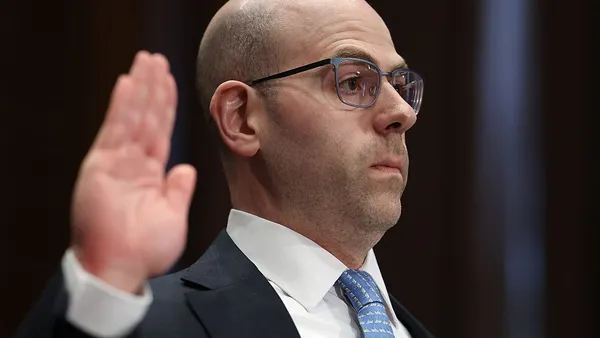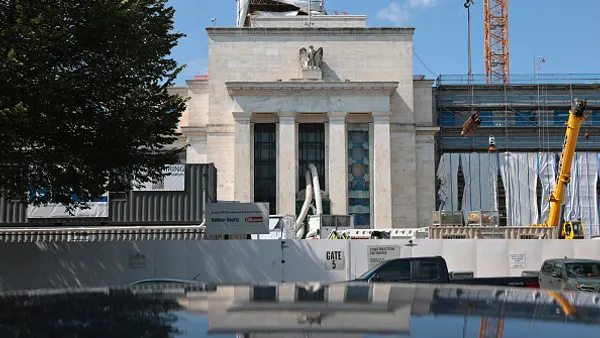Dive Brief:
- President Donald Trump signed an executive order Tuesday that expands his authority over independent agencies, including the Federal Reserve.
- Under the order, independent agencies must submit for review “significant” regulations to a unit within the Office of Management and Budget, led by Russ Vought. The order gives Vought power over independent agencies’ budgets and enables him to draft “performance standards and management objectives” for independent agency heads. It also prohibits agencies from taking legal positions that differ from those of Trump or Attorney General Pam Bondi.
- The order applies to the Fed as it relates to “conduct and authorities directly related to its supervision and regulation of financial institutions,” but the Fed board and the Federal Open Market Committee would maintain independence over monetary policy.
Dive Insight:
Agencies such as the Securities and Exchange Commission, the Commodity Futures Trading Commission and the Federal Trade Commission – which Congress established as independent from the White House – would also be affected by the order.
The carve-out for the Fed on monetary policy “seems directed toward preventing a negative market reaction to the order,” said Jeff Naimon, a Washington, D.C.-based partner at law firm Orrick.
The agencies also have to employ a White House liaison, and consult regularly on policy and priorities with the OMB, the White House Domestic Policy Council and the White House National Economic Council, according to the order. The OMB will “adjust so-called independent agencies’ apportionments to ensure tax dollars are spent wisely,” according to a fact sheet that accompanied the executive order.
“These regulatory agencies currently exercise substantial executive authority without sufficient accountability to the President, and through him, to the American people,” the order said. “Moreover, these regulatory agencies have been permitted to promulgate significant regulations without review by the President.”
The move to expand Trump’s authority is the latest by an administration that’s sought to concentrate power under the executive branch. It also reflects the influence of Vought, one of the architects of conservative blueprint Project 2025, and broadens his supervisory powers. In addition to leading OMB, Vought also is acting director of the Consumer Financial Protection Bureau.
“For the Federal Government to be truly accountable to the American people, officials who wield vast executive power must be supervised and controlled by the people’s elected President,” the order continued.
Naimon noted there was strong coordination between independent agencies and the White House during Trump’s prior administration, but the executive order would now require that coordination.
Legal challenges to the order are “almost certain,” Kathryn Judge, a Columbia University professor of law, said in an email.
The outcome of any litigation is less clear, however, since the judiciary has embraced a more unitary view of the executive branch and a more expansive view of executive authority, she added.
The order “represents the largest single assertion over executive power over the administrative state that I can recall, not only in my lifetime but through history,” Peter Conti-Brown, a professor of financial regulation at the University of Pennsylvania’s Wharton School, said in an email. “Some aspects of this control represent departures from long-standing norms. Others are in apparent contravention of statute and will be challenged legally.”
“How much of the modern independent regulatory system survives the Trump Administration’s efforts at consolidation is anyone’s guess,” Conti-Brown said, noting that the Supreme Court has repeatedly expressed skepticism of independent agencies. SCOTUS did, however uphold the funding structure of the CFPB.
Banks may welcome the development in the near term, since the Trump administration is widely expected to usher in an era of reduced regulatory burden. But “those shifts would be far less enduring than if implemented in other ways,” Judge said.
“Longer term, the result may be a whipsaw in regulatory and supervisory expectations,” she said. “That will make it harder for banks to make operational and other decisions that are core to their business.”














